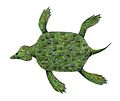Woolungasaurus
| Woolungasaurus Temporal range:
| |
|---|---|

| |
| Holotype paddle | |
| Scientific classification | |
| Domain: | Eukaryota |
| Kingdom: | Animalia |
| Phylum: | Chordata |
| Class: | Reptilia |
| Superorder: | †Sauropterygia |
| Order: | †Plesiosauria |
| Family: | †Elasmosauridae |
| Genus: | †Woolungasaurus Persson, 1960 |
| Species | |
| |
Woolungasaurus ('Woolunga lizard', named after an Aboriginal mythical reptile, Persson 1960) is a dubious genus of plesiosaur, an extinct marine reptile, belonging to the Elasmosauridae.
History
[edit]
The type species, Woolungasaurus glendowerensis, was named after Glendower Station by Per Ove Persson in 1960,[1] is known from a partial skeleton, holotype QM F6890, (forty-six vertebrae, ribs, forearms, shoulder girdle and part of the rear limbs) unearthed from the Wallumbilla Formation (Albian, Lower Cretaceous) of the Richmond District, Queensland, Australia. Another find of undetermined species, consisting of twelve vertebrae, was unearthed from the Maree Formation (Cretaceous, of uncertain age) of Neales River, near Lake Eyre, South Australia. A skull formerly referred to this genus from Yambore Creek, near Maxwelton, Queensland, is now the holotype of Eromangasaurus.

However, because of the uninformative, flawed diagnosis of Persson (1960), Welles (1962) considered Woolungasaurus a nomen dubium.[2][3] In 2004, the genus was referred to Styxosaurus by Sven Sachs in 2004.[2] Kear (2005) disagreed with this view and followed the interpretation by Welles (1962), rendering the genus to be an indeterminate elasmosaurid.[3]
See also
[edit]Notes
[edit]- ^ Persson, P.O., 1960, "Lower Cretaceous Plesiosaurians (Reptilia) from Australia", Lunds Universitets Arsskrift 56(12): 1-23
- ^ a b Sachs, S., 2004, "Redescription of Woolungasaurus glendowerensis (Plesiosauria: Elasmosauridae) from the Lower Cretaceous of Northeast Queensland", Memoirs of the Queensland Museum 49(2): 713-731
- ^ a b Benjamin P. Kear (2005). "A new elasmosaurid plesiosaur from the Lower Cretaceous of Queensland, Australia". Journal of Vertebrate Paleontology. 25 (4): 792–805. doi:10.1671/0272-4634(2005)025[0792:ANEPFT]2.0.CO;2. S2CID 86297695.
References
[edit]- Long, J.A. 1998. Dinosaurs of Australia and New Zealand. UNSW Press.







